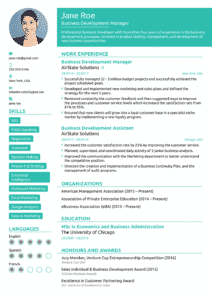When your writing your first resume you should keep in mind crucial tips. This article will explain those resume musts.
The US saw an increase of 164,000 new jobs in April alone and the unemployment rate amongst graduates has remained stable at approximately 4% for a few years – yet there is no reason to relax. Statistics only show that there are positions being made available and filled.
What they don’t tell you is how many of those graduates are landing the job of their dreams. Whether you decide to use an exceptional resume writing site or to go it alone, you need to know what good looks like. While there is work out there, it is vital that your resume makes you stand out in the right way. It is vital that you get the right start to set you up for life.
Tips for Writing Your First Resume
1. Style and format
Resumes have no set format and this can lead to candidates interpreting this as a license to do whatever they feel on paper. While there are some niche positions where a visual bombardment will stand out in the right way, these are few and far between.
With resumes, conformity is key. Human Resource departments will only spend a few seconds looking at your application before moving onto the next. If they don’t see what they want they will simply pick up the next one after giving your file a cursory look.
When creating a resume, keep in mind that there is a wide range of templates available online to choose from. These are recognized formats that resume-reader software and HR departments are familiar with. They also have the advantage of guiding you through the construction of your application. These are good, but you may also wish to consider using a professional service to help you create your resume.
If you decide to just go it alone then keep it as simple as possible. Pick a readable and professional-looking font such as Times New Roman or Arial and use it throughout. Keep the formatting simple and do not overuse bold, italics or underlining. Sometimes it will look better to get emphasis by increasing from 12 point to 14 for a title or name rather than underlining it. Never go beyond two pages– keep it short and to the point.
2. No two resumes are the same
Resumes should be crafted for the position being applied for. The skills and experience you highlight will be specifically tailored to what is required by the employer. Before you start to write your resume you will need to know who you are writing it for.
Job applications typically will have job descriptions or even descriptions of the skills and experience wanted from a successful candidate. These tables are your framework for both your resume and cover letter. Some roles will go as far as to tell you where they will be looking for evidence of you meeting that skill (interview, resume or cover letter).
If you are applying speculatively or the company has not provided a description of this type then it is important that you research what the role will entail and use this information to inform your construction.
3. Order it correctly and highlight your strengths
You are just starting out and you won’t have several positions to discuss and show off about. This doesn’t mean that you have nothing to say. In a conventional resume, the candidate would lead off with their work experience in reverse chronological order (starting with the most recent first).
you have relevant and strong work experience you will want to leave this section until later. For your first resume you will need to lead off with your qualifications and education history. Include grades and GPA if they are good, otherwise just give details of what was studied. Craft your resume to suit the position – you will include your whole education on every version but which essays, feedback and course content you highlight will depend upon what the role needs.
Next, focus on your skills and related experience. Are you IT competent? Have you got leadership experience from scouting or other voluntary activities? If you are used to working to deadlines, employers may have forgotten that aspect of college life, so remind them. If you have ever organized an event, describe it. Look at what they want from an employee and find something from your life to match it.
4. Get the basics right
It doesn’t matter how good you are, basic mistakes will cost you a job. Read everything carefully, check the spelling, grammar, and formatting. Once you’ve looked at it close up, look at it from a distance.
Don’t focus on the words anymore but the style, does it look clean and professional, or is it busy and childish? Have you included your name and contact details on both pages? Have you tailored it to their job? If you’ve got a cover letter is it addressed to the right company throughout? Have you used advanced and recent formatting that older versions of Word will struggle to render?
Remember many companies, especially in the government sector, will only upgrade operating systems and software when it becomes absolutely necessary. Keep it simple. Don’t include any photographs, references or personal objectives, and only have a link to your blog if it is well written and relevant.
These Are The 6 Best Resume Tips That’ll Get You Hired
The best tips for writing a great resume. Implement these best resume tips on your next job application and see how fast you’ll get an interview!
Recruiters and human resource managers are seeing a plethora of resumes cross their desks these days, most of them rife with errors. If you want to get more interview requests, you need to make sure your resume is up to snuff with these six resume writing tips.
If you are swamped for time, take a look at this quick video that sums it up perfectly:
If you didn’t like the video or want more advice, check out the best resume writing tips below.
The Best Tips for Writing a Great Resume
Here are some tips for writing a great resume that you should incorporate so that you can boost your career.

Resume Tip 1: Use Great Formatting
The initial look at your resume will last less than thirty seconds, no matter how tight the copy. If it is difficult to scan due to excessive length or poor organization, it might get tossed in the reject pile.
Make sure that you use a readable font, definitive headings, and wide margins. Utilize bold and italics to help make scanning easier. Bullet lists are a great way to highlight important points.
Resume Tip 2: Focus on Accomplishments Rather than Plain Descriptions
Hiring managers need to know what potential employees can bring to the table that will help build their company and solve existing problems. You need your resume to show them how you have been able to use your skills in the past to troubleshoot similar issues with success and to the satisfaction of your former employers.
Tell them what you did, not what the job description requires. Start with one to two lines about the job description, then follow up with your actual accomplishments. Show off what benefits you brought to the company. These should showcase your skill set, not a generic idea of what the role you were supposed to play in the company.
Resume Tip 3: Quantify Your Accomplishments
One of the most common resume mistakes is to focus on jargon rather than accomplishments. Remember that the point of your resume is to market yourself, selling your skills and strengths rather than a general bio.
Show off specific things that you have done that show why you are the perfect candidate for the position. Gain their interest by using specific wording for your achievements and using hard facts and figures to back your claims. If you aren’t sure, consider what would have occurred had you not performed your role well.
Resume Tip 4: Consider the Industry
Mechanic engineering resumes should not use a lot of creative designs like those in advertising and other artistic fields. Too much distinction in your presentation can be a sure way to get your resume skipped over.
Remain conservative and make sure that you have tight, error-free copy on attractive paper.
Resume Tip 5: Use a Career Summary Rather than an Objective
Objectives are often generic because everyone is seeking essentially the same thing: a fulfilling job that uses their skill set. On the other hand, a career summary shows them who you are and your capabilities.
You need to hook them from the start because you only have one chance to make a first impression. Your summary should grab their eye and show them how you can become an invaluable member of the team who is capable of bringing your A-game to the table and provide viable solutions.
Resume Tip 6: It’s All About Networking
If you are currently unemployed, then you should make a full-time job out of searching for a job. Networking is an essential aspect of getting your name and reputation out there. Senior and mid-level positions are often filled via networking opportunities, and you need to make sure that your name is on the lips of the right folks. Not only should you work with recruiters, let others in your industry know your needs. They can provide great insights and recommendations.
Networking includes previous business contacts, including former employers and subordinates. Additionally, sales reps and vendors who you have had positive relations within recent years. Also, check the alumni directory of your alma mater for other potential connections.
What Makes An Amazing Resume?
Okay, so what makes an amazing resume? How can you stand out to employers? Remember, it’s a great idea to find out if your employer uses an Applicant Tracking System (ATS). This is a type of software that scans your resume for keywords before passing it onto an actual human being. If you need an ATS resume, you’ll need to change up the format. Luckily, if you don’t want to do all the work yourself you can use a template for does all the work for you.
If you use these tips for creating your resume, you will be much closer to securing an interview. Remember, a resume is to market yourself, selling your skills and strengths to secure your dream job and advance in your career.
Writing Your First Resume Conclusion
The construction of your resume needs to start in high school. As soon as you know what sort of job you’d like, you need to gather experience for this. Join clubs, lead events, take part in things and volunteer. Model United Nations events, scouting, student newspapers and even shadowing of people doing a role you want are all useful. Make a note of things as you go along so that you can refer back to them at a later date.
If you are faced with writing your first resume now and lack this experience, it isn’t too late. Speak to your former teachers and your parents – often they will remember your past much better than you did. Get stuck in and volunteer now, ask to shadow people and do the research. You may be late to the party but it is important to show you are still prepared to go the extra mile. Keep it simple. Keep it clear. Keep it focused.
Want to Make Extra Money Now?
|

Hi! This post could not be written any better! Reading this post reminds me of my previous room mate! He always kept talking about this. I will forward this page to him. Pretty sure he will have a good read. Thanks for sharing!
Glad you enjoyed it and hope you passed it along to your friend!